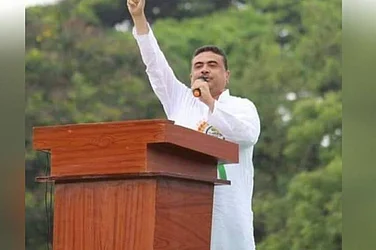Denizens of Ghazipur regard theirdistrict as a political barometer of eastern Uttar Pradesh. Deen Dayal Upadhyay,they claim, once prophesied that if the Jan Sangh ever managed a toehold inGhazipur, it would rule UP. The story may be apocryphal, but they are quick topoint out that when the BJP won two assembly seats in the district in 1991, itcame to power in the state. In 1996, it won the two Lok Sabha seats in thedistrict and enjoyed a brief stint at the Centre.
In the 1996 assembly elections,the BJP looks set to improve its position not only in Ghazipur—where it lostall seven seats in 1993—but the rest of eastern UP. Former chief ministerKalyan Singh’s confident "Poorvanchal mein tarang nahin, sailaab hai (it’snot a wave, it’s a flood)" is certainly overstating the case; each seatwill see a hard-fought triangular contest, with the BJP benefiting from asplintered opposition.
In political terms, the region has three distinguishing features: no regional leader of stature (Chandra Shekhar’s influence is con-fined to Ballia, and Kalpnath Rai’s—whose Poorvanchal Vikas Manch has not created any waves—to Ghosi), a strong criminal-politician nexus and an influential Muslim vote.
A record number of candidates with criminal backgrounds (215 with criminal records, of whom half are ‘hardened’ offenders) are in the fray, BSP nominee Mukhtar Ansari being themost colourful of the lot. Rakesh Yadav, Ajay Rai, Virendra Rai, Hari ShankarTewari, Chillu Par, V.P. Sahi and Pradeep are equally feared. But the dons arekeeping their guns out of sight for now, thanks to Election Commissioner M.S.Gill, who ticked off the BJP’s Ajay Rai for an unseemly display of money andmuscle power while filing papers.
According to IG G.L. Sharma, abouttwo lakh ‘bad’ characters have been "bound down", another 8,000arrested, 22 illegal arms factories closed and a veritable truckload ofunauthorised weapons—including 73 bombs—seized. Borders with Bihar have beensealed "to keep trouble-makers out". Ansari anticipates poll violence,but not in his own constituency: "Kaun mai ka lal hamarey hotey huey gadbadkarega (who will dare to create trouble with us around)?"
The all-important Muslim community still appears to favour the United Front in general and Mulayam Singh Yadav in particular, despite the aggressive efforts of the Bahujan Samaj Party to woo them. "Where we see a winning BSP candidate, we will certainly vote forhim, but by and large we are with Mulayam," said Mohammad Fali Ansari,former mayor of Varanasi. He describes Imam Bukhari’s fatwa in favour of theBSP as "bematlab (meaningless)".
Going by current indications, a strong Hindu backlash is expected in at least 10 assembly constituencies where the minoritycommunity accounts for more than 20 per cent of the voters. "In such seg- ments, we can expect Hindus to vote en bloc transcending caste divisions," says a political observer. Caste factors come into play where the Muslim community numbers less than 20 per cent,he adds.
In the 15 districts of the Gorakhpur, Varanasi and Azamgarh divisions comprising a little over 100 seats, the BJP had won 48 in 1991. In 1993, bereft of a Ram lehar and facing a strong Dalit-OBC-Muslim axis, it won 30. But in the 1996 Lok Sabha poll, it scooped up 18 of the 23 seats in the region. A trend which the party hopes willbe carried over to the assembly elections. Overall, the BJP is assured of an undivided upper-caste vote. The extent of fragmentation of the backward and minority votes will determine its fortunes here.
As for the BSP, its efforts to weld a Dalit-Brahmin-Muslim axis may not have borne fruit, but eminent political analyst H.N. Tripathi believes that the party has consolidated its position since the general elections. He predicts a pronounced polarisation of Dalit and backward votes, thanks to the increasing caste chauvinism among backward communities. Trade union leader Hiralal agrees: "BJP and BJP votebanks are undivided, but the UF’s are fragmented."
Given rampantelection-fatigue, the BJP’s committed rain-or-shine voters may be another pluspoint. For uncommitted voters like Sushil Kumar, it’s a tough choice:"I’d have voted for anyone who talked about the price rise, but nobody has."








.png?auto=format%2Ccompress&fit=max&format=webp&w=768&dpr=1.0)




.png?auto=format%2Ccompress&fit=max&format=webp&w=376&dpr=2.0)




.png?w=200&auto=format%2Ccompress&fit=max)







